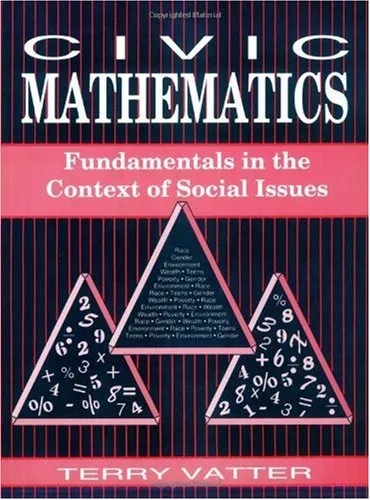Civic Mathematics: Fundamentals in the Context of Social Issues
3.8
Reviews from our users

You Can Ask your questions from this book's AI after Login
Each download or ask from book AI costs 2 points. To earn more free points, please visit the Points Guide Page and complete some valuable actions.Welcome to the introduction of Civic Mathematics: Fundamentals in the Context of Social Issues, a book designed to bridge the gap between mathematical principles and pressing social issues of our time. This book serves as a comprehensive guide for readers who seek to deepen their understanding of civic engagement through the analytical lens of mathematics. By marrying the precision of numbers with the complexities of societal challenges, this book empowers readers to think critically, act responsibly, and contribute meaningfully to their communities.
Summary of the Book
Civic Mathematics: Fundamentals in the Context of Social Issues explores the intersection of mathematics and civic life, emphasizing the importance of quantitative reasoning in understanding and addressing social and political issues. The book is divided into several interconnected chapters, each addressing different areas where mathematical tools can be applied to foster equitable and informed decision-making.
From analyzing voting systems and understanding income inequality to examining environmental sustainability and assessing public health policies, this book leverages mathematics to clarify complex concepts. Its aim is not merely to teach formulas or equations but to contextualize them within real-world scenarios that affect people and communities worldwide.
Written in an accessible and engaging tone, the content is structured to appeal to a wide range of readers, including students, educators, policymakers, and anyone with a vested interest in social justice. The book blends theoretical frameworks with practical examples, providing readers with actionable insights and tools to navigate today’s multifaceted challenges.
Key Takeaways
- Learn how mathematical concepts like probability, statistics, and algebra can be applied to social issues such as income inequality, climate change, and public health.
- Understand the foundational role of data in driving equitable and transparent societal decisions.
- Discover how mathematics can demystify political systems, such as understanding gerrymandering, voter turnout, and fair representation.
- Develop critical thinking skills to identify biases in statistics, surveys, and published studies.
- Gain tools for responsible civic engagement, supported by mathematical evidence and reasoning.
Famous Quotes from the Book
"Mathematics is a language of clarity, but its utility shines brightest when used to illuminate the messy complexities of our shared human experience."
"To participate in civic life without understanding the numbers behind it is to walk into battle unarmed."
"Every statistic we encounter carries a story; interpreting it responsibly is both a mathematical and moral duty."
Why This Book Matters
In an era marked by information overload, political polarization, and global challenges like climate change, poverty, and public health crises, the ability to interpret and apply mathematical concepts to societal issues has never been more critical. This book underscores the importance of quantitative literacy in cultivating informed citizens who can discern fact from fiction, engage constructively in political discourse, and advocate for policies rooted in fairness and evidence.
Beyond its immediate educational value, Civic Mathematics represents a broader call to action. It seeks to instill in readers a sense of civic responsibility, showing how mathematics is not just an abstract subject confined to academic settings but a powerful tool with real-world implications. By providing readers with the knowledge and skills to scrutinize data, question assumptions, and seek objective truths, this book equips them to navigate and address some of the most pressing issues of our age.
Ultimately, this book matters because it offers more than mathematical knowledge; it fosters a mindset of critical inquiry, ethical reasoning, and collective action. Through its pages, readers will discover that civic engagement and mathematical rigor are not separate pursuits but complementary facets of an educated and empowered society.
Free Direct Download
Get Free Access to Download this and other Thousands of Books (Join Now)
For read this book you need PDF Reader Software like Foxit Reader


